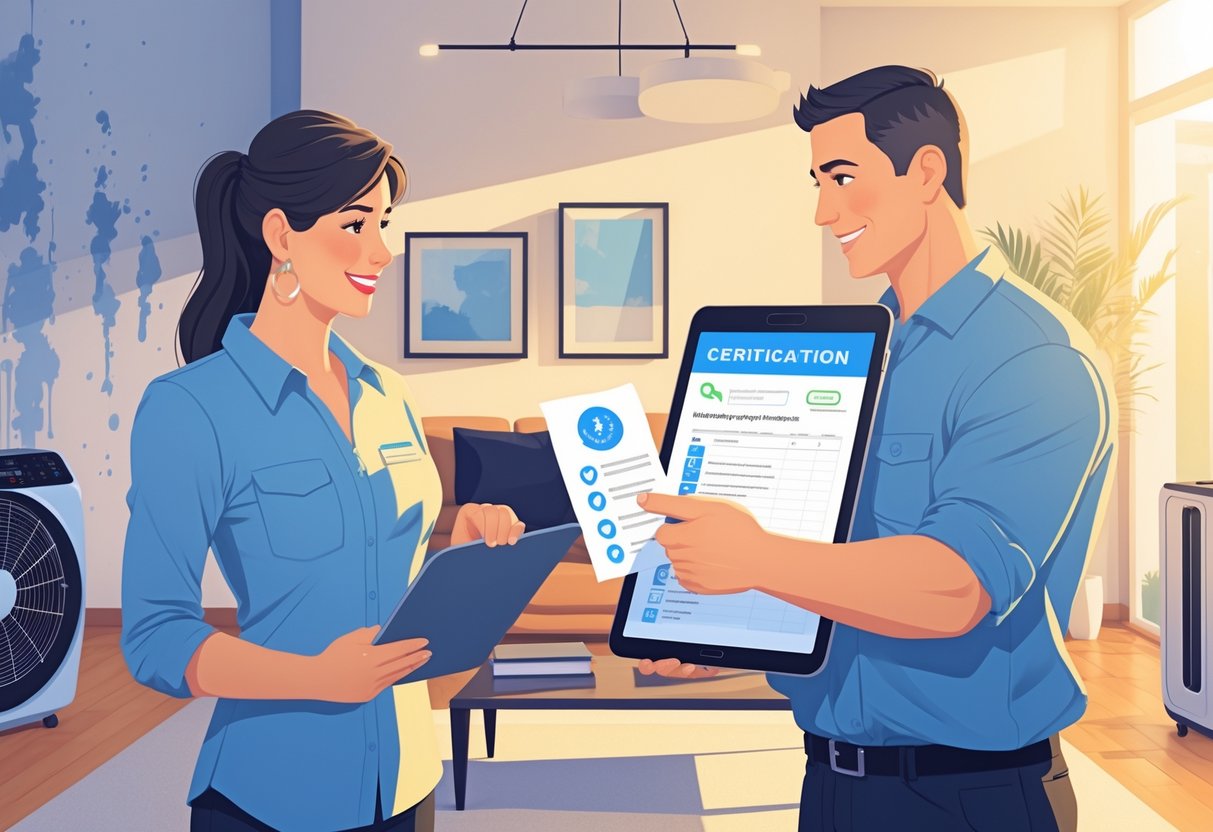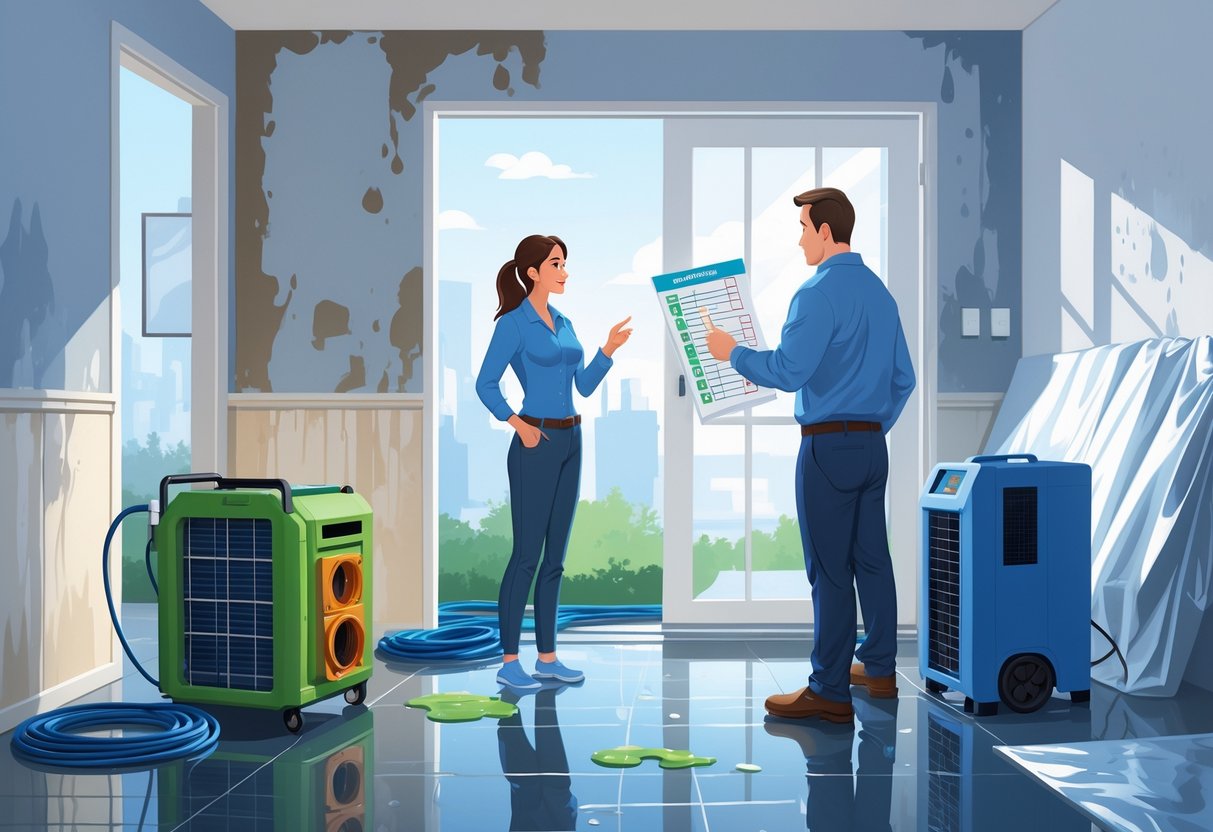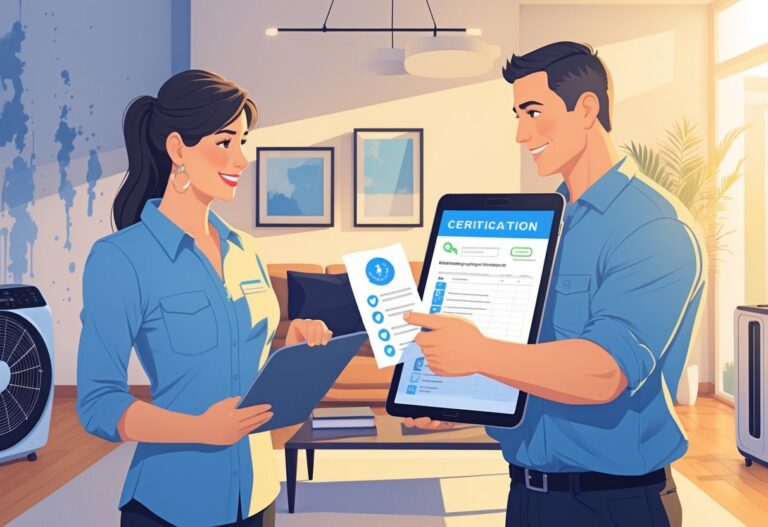Choosing the right water damage restoration company can really save you a lot of time and money, especially when you’re in the middle of a stressful mess. The most important step is to select a restoration service with strong credentials, proven experience, and transparent pricing.
These things help protect your property and make sure repairs are handled the right way, not just the fast way.

It’s tough to know who to trust with so many companies out there. Reading reviews, checking what services they actually offer, and asking good questions can make the process a little less overwhelming.
A reliable restoration company will go beyond just the repairs—they’ll help with insurance paperwork and stick around for support after the job’s done.
Need a Home Fix – Emergency or Routine?
From leaks and no-heat nights to simple tune-ups, our 24/7 hotline connects you with trusted local pros in minutes.
Key Takeaways
- Only hire companies with proper credentials and good reputations.
- Compare service offerings and make sure pricing is clear.
- Look for help with insurance and follow-up support.
Understanding Water Damage Restoration Services

Good water damage restoration starts with figuring out exactly what kind of water problem you’re dealing with and where it came from. The right fix depends on the situation, and if you skip steps, you can end up with mold or even structural headaches later on.
Types of Water Damage
Water damage isn’t all the same—it might come from busted pipes, leaky roofs, heavy rain, flooding, or storms. Not every water source brings the same risks, so most pros break it down into three types:
| Type | Description |
|---|---|
| Clean Water | From sources like faucets or rain; less risk. |
| Gray Water | Slightly dirty water, e.g., from appliances. |
| Black Water | Contains harmful bacteria, usually from flooding. |
Recognizing the type of water is a big deal. Cleaning up black water takes more gear and stronger sanitizing than clean water does.
Restoration companies also check for other problems, like smoke damage (if there was a fire) or mold issues from all that moisture.
Disaster Restoration Vs. Standard Restoration
Disaster restoration comes into play after big events—floods, hurricanes, that sort of thing. These jobs usually cover large areas and might involve storm debris, mud, sewage, or even chemicals.
Standard restoration is more about everyday problems, like a leaky washing machine or a small pipe burst.
Disaster restoration often takes longer and means dealing with more hazards—think water extraction, heavy-duty drying, and mold cleanup. Companies that handle disasters usually have bigger, more specialized equipment for these jobs.
Core Restoration Process
The main process follows careful steps to get your property back to a safe state. First, they get rid of any standing water using pumps or vacuums (that’s the water extraction part).
Next up is drying and dehumidification. They’ll use fans and dehumidifiers to pull moisture out of walls and floors, which is key for stopping mold and further damage.
After things are dry, sanitizing and cleaning come in. Special cleaners kill germs and help prevent mold. If they find mold, then mold remediation is a must to keep your home healthy.
A good company will check for hidden moisture and actually tell you what they’re doing, step by step. That’s reassuring, isn’t it?
Evaluating Restoration Companies’ Credentials
A water damage restoration company needs the right qualifications to do the job safely and legally. Checking their licensing, insurance, and training protects you from costly mistakes down the road.
Licensing and Insurance
A reputable restoration company should be both licensed and insured. Licensing means they’re following state rules and industry standards, not just winging it.
Most states require a valid license for water damage work. It’s smart to ask for their license number and double-check it on your state’s licensing website.
Unlicensed companies might skip corners on safety or quality, and that’s just not worth the risk.
Insurance is a must—liability and workers’ comp, at the very least. If a worker gets hurt or something else goes wrong, insurance covers it. Otherwise, you could be on the hook for damages or injuries.
Here’s a quick checklist to keep handy:
| Credential | What to Ask For | Why It Matters |
|---|---|---|
| Business License | License number | Proves they can legally operate |
| Liability Insurance | Proof of coverage | Protects from damages or lawsuits |
| Workers’ Comp | Proof of coverage | Covers worker injuries |
Certifications and Professional Training
Restoration companies should have certifications showing their staff actually knows what they’re doing. The IICRC certification (that’s Institute of Inspection, Cleaning, and Restoration Certification) is the big one in this field.
IICRC-certified techs have taken classes, passed tests, and follow strict guidelines. That helps prevent mold and other headaches after water damage.
Ask who’s working in your home and if they’re certified. Some companies list certifications right on their website or business cards. It’s worth hiring folks who are trained and certified—you want the job done right the first time, not a patch job.
Assessing Reputation and Experience

When it comes down to it, most people pick a restoration service based on reputation and experience. You want someone who’s been around the block and has a good track record, right?
Checking Online Reviews and Testimonials
Online reviews are a fast way to get the vibe on a restoration company. Google, Yelp, and Better Business Bureau are the usual places to look.
It makes sense to look for things like:
- Consistent high ratings (4 stars or above)
- Detailed feedback about work quality and response times
- How they handle negative reviews (do they fix problems or ignore them?)
Read both recent and older reviews to see if they’re steady over time. Testimonials on the company’s own site are nice, but third-party reviews are usually more honest.
Comparing reviews side by side can make patterns pop out:
| Company Name | Google Rating | Yelp Reviews | BBB Rating |
|---|---|---|---|
| Blue Water Restore | 4.7 | 40 | A+ |
| SafeClean Solutions | 4.5 | 15 | A |
| Fast Response Restore | 3.9 | 10 | B |
The best restoration companies handle complaints professionally and have mostly positive feedback. That’s a good sign they care about their customers.
Years in Business
How long a company’s been around can tell you a lot about their experience. A longer track record usually means they’ve seen a wider range of problems and know how to handle them.
Ask questions like:
- How many years have you been doing water damage restoration?
- Are your team members certified or trained in this kind of work?
Companies with at least five years under their belt often have good relationships with local insurance providers and know the building codes. They’re usually better prepared for tricky jobs or emergencies.
Service Offerings and Specializations
Not every company handles water damage the same way. Some are all about quick emergency help, while others focus more on mold problems to keep things safe long-term.
Emergency Service and Response Time
Homeowners need fast action when water damage hits. Many companies offer 24/7 emergency services—a huge relief if disaster strikes at night or on a weekend.
Response time is huge. The faster help arrives, the less damage water can do. Some companies guarantee they’ll be there within an hour; others even post their average arrival times online.
Typical emergency services include water removal, drying and dehumidification, and quickly assessing the damage. When you’re comparing, ask questions like:
- How quickly can you get here?
- Will your team bring all the necessary tools on the first visit?
- What’s your process in the first few hours?
Going with a company that’s reliable in emergencies can speed up repairs and help prevent more damage.
Mold Remediation and Prevention
Water damage left too long can lead to mold—nobody wants that. Some companies specialize in mold remediation and prevention to tackle and stop mold growth before it becomes a bigger issue.
When you’re picking a company, see if they offer:
- Mold inspection after they’ve dealt with the water
- Safe, thorough mold removal steps
- Advice or services to help keep mold from coming back
Companies that handle mold will use special cleaners and gear to make sure it’s all gone. Some even offer home checks and tips to help you keep things dry and safe.
Ask if they know local rules for mold cleanup, and if they can explain what they do to keep mold from returning. It’s worth choosing a company that’s good with both water and mold issues—it can save you headaches and money down the line.
Evaluating Estimates and Cost Transparency
Picking the right water damage restoration contractor means you need to really understand their pricing and what’s included. Always compare several quotes and look closely at what’s actually in the service agreement—nobody likes hidden fees.
Requesting Detailed Quotes
If you’re a homeowner, it’s smart to ask for written, itemized estimates from each water damage restoration contractor you’re considering. These quotes ought to break down every service—water extraction, drying, mold removal, repairs, the whole list.
Look for estimates that spell out labor and materials separately. It’s helpful if they mention how long each part might take.
Don’t be shy—ask if the contractor offers a guaranteed price or if there’s a chance it’ll change halfway through the job.
Compare quotes side by side with a simple table:
| Service | Contractor A | Contractor B | Contractor C |
|---|---|---|---|
| Water Extraction | $350 | $400 | $375 |
| Drying & Dehumidifying | $200 | $250 | $230 |
| Mold Remediation | $300 | $350 | $340 |
| Repairs | $500 | $450 | $475 |
| Total | $1350 | $1450 | $1420 |
Tip: If one quote is much lower than the others, ask why. Sometimes a bargain means corners are being cut or materials aren’t up to par.
Cost Factors and Hidden Charges
Watch out for extra charges that weren’t in the first estimate. These can sneak in as overtime fees, emergency premiums, equipment rental, or surprise material costs if the damage is more widespread than anyone thought.
Ask for a list of possible add-ons. Some companies bump up the price for after-hours work, weekends, or extra drying days. And don’t forget to check if insurance claims handling is included or if there’s a sneaky service fee.
Read the contract closely. If anything’s fuzzy or doesn’t make sense, get it in writing before they start swinging hammers. It’s just better for everyone if the costs are clear from the get-go.
Navigating Insurance and Claims Assistance
Dealing with water damage is stressful enough—figuring out how a restoration company handles insurance shouldn’t make it worse. The right company can actually make claims less of a headache and help you get the paperwork together.
Working With Insurance Companies
Some water damage pros work directly with big insurance companies. That saves you time and can help you avoid those annoying claim mistakes. They should be upfront about their experience working with insurers, and honestly, they should know how to talk to adjusters, too.
Here are a few good questions to ask:
- Does the company deal regularly with major insurers?
- Will their staff help file the insurance claim?
- Can they answer what’s covered or not covered?
Plenty of companies keep lists of approved vendors for different insurance providers. This might speed things up and could even help your claim get approved. It’s worth checking if they know the ins and outs of your specific insurance process.
Documentation Support
Documentation is everything when it comes to a water damage claim. Most restoration companies take photos, keep notes, and write up itemized lists of what’s damaged. Insurance adjusters will want to see all of that.
A reliable company will:
- Hand over copies of all reports and photos to you.
- Help you fill out claim forms so nothing gets missed.
- Keep a timeline of what happened and when repairs took place.
They should walk you through which documents you’ll need and help keep everything organized. It’s a relief when someone else knows the drill. Having good records can also smooth things out if you and the insurance provider don’t see eye to eye.
Aftercare and Follow-Up Support
A trustworthy water damage restoration company won’t vanish the second the cleanup’s done. They’ll stick around to check for hidden problems and help with getting your stuff back into shape.
Post-Restoration Inspections
A good company will come back for follow-up inspections after the main work is finished. They look for leftover moisture, mold coming back, or structural issues that might’ve been missed. It’s a smart way to keep your home safe.
These inspections might use moisture meters or thermal cameras to spot damp spots. Documentation—photos and reports from these visits—can be handy for your insurance, too.
It helps if the company sets up a simple schedule for check-ins, like a visit in a week and another in a month. Just make sure you know how many inspections are part of the deal and which ones might cost extra.
Early follow-ups catch problems before they get out of hand.
Restoring Personal Property
Restoring your stuff means cleaning, drying, and trying to save valuable things. Companies often handle furniture, clothes, electronics, and keepsakes. Some use special drying rooms or cleaning methods, and sometimes they have tricks for getting out those stubborn odors.
A list is useful for tracking what needs attention. Here’s a sample table for staying organized:
| Item Type | Treatment | Status |
|---|---|---|
| Sofa | Cleaned/dried | Restored |
| Laptop | Air-dried | Under review |
| Photo albums | Dehumidified | Restored |
Communication between you and the company matters here. You want to know what can be saved and what’s probably a lost cause. Look for a service that explains their process, keeps you in the loop, and doesn’t spring surprise costs on you.
Frequently Asked Questions
Choosing a reliable water damage restoration company? Focus on experience, credentials, and what past customers have to say. Make sure you actually understand the pricing—don’t be afraid to ask questions before you sign anything.
What factors should be considered when choosing a water damage restoration service?
Look for companies with real experience handling your kind of damage. Fast response is key—water waits for no one. It’s also worth checking if they offer emergency help and work directly with your insurance.
How can I compare the quality of services offered by different restoration companies?
Check what equipment they use—air movers, water extractors, that sort of thing. Mold prevention is a must. See if they’ll give you a written estimate and how quick they are to respond.
What qualifications and certifications should a reputable water damage restoration company have?
Technicians should be certified by the Institute of Inspection, Cleaning and Restoration Certification (IICRC). State licenses and insurance? Absolutely. These show they take safety and standards seriously.
How do I evaluate customer reviews and testimonials for water damage restoration companies?
Read reviews on independent sites, not just the company’s own page. Look for consistent praise about quality, professionalism, and timeliness. If you see the same complaints over and over—especially about billing or unfinished work—that’s a red flag.
What are common pricing structures for water damage restoration services?
Many companies price by the size of the affected area. Some have flat rates for specific jobs, others charge by the hour or by equipment used. Watch for extra fees for emergencies or big jobs—those can add up fast.
What questions should I ask a restoration service provider before hiring them?
Start by asking how quickly they can respond if you need help. It’s worth checking their credentials too—are they certified, and do they carry full insurance?
Don’t forget to get a written estimate, and make sure you know exactly what’s covered. You might also want to ask if they deal with insurance claims directly, and whether they offer any follow-up visits after the job’s done.







Leave a Reply